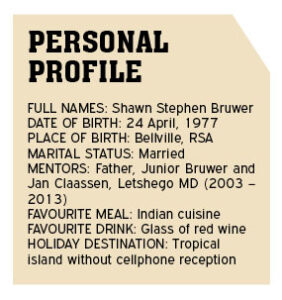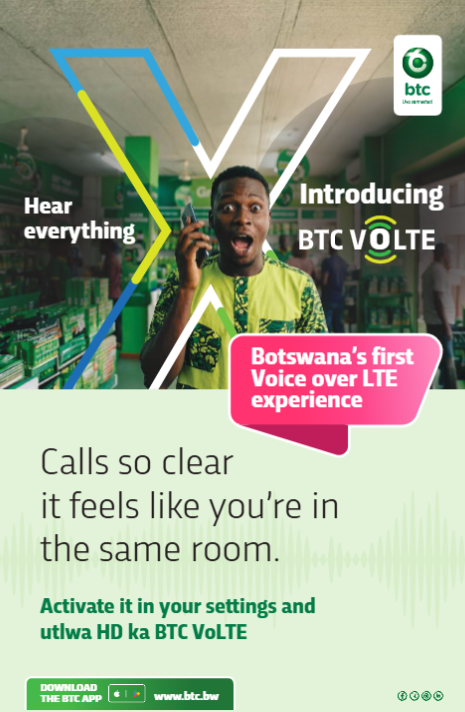Meet the boss
After successful spells with first FNB and then Letshego, reaching the upper echelons of both, in 2015 Shawn Bruwer decided to go it alone and start his own business.
A year later, Paratus Botswana was born.
With Bruwer, 45, at the helm as Managing Director (MD), the company has swiftly established itself as the country’s leading connectivity expert.
Specialising in voice, internet, satellite, and hosting solutions, Paratus Botswana takes pride in providing high quality internet connectivity.
Without further ado, lets meet the brains behind the brand…
-
Tell us a bit about yourself.
I grew up in Windhoek, Namibia, and after studying in Stellenbosch returned to work for FNB where I had the opportunity of working in various departments eventually leading the Electronic Business function, which included ATM’s, POS, Internet Banking and some in-house development.
I was approached by Letshego in 2006 and moved to Botswana to take on the opportunity. At Letshego, in the beginning, my main task was to establish the Zambian subsidiary. After successfully establishing the business, I moved on to manage various country expansions as well as the technology for the group eventually working my way to CIO and then COO, and finally Deputy MD for the group. I left in 2015 to pursue a passion to establish my own business.
I established Paratus Botswana in 2016 and have been the MD since.
-
Before we focus on Paratus, let’s talk about your educational background?
I am a Chartered Management Accountant (ACMA) with a Business Honours degree from the University of Stellenbosch. I also have a diploma and certificates in Banking and completed various Management and Executive Development programmes during my career.
-
So what services does Paratus provide?
We provide various solutions including Paratus Internet, which is sourced internationally, National/International Networks, Voice solutions such as PBX or Least cost routing, VSAT, Cabling and Network equipment, hosted/cloud services such as virtual machines, storage, firewalls, email to mention a few. We also offer independent connectivity on Paratus Fiber or microwave.
-
In what is a pretty competitive market, how does your company stand out from the rest?
Paratus provides a quality, reliable solution with service excellence. We own our own network and infrastructure and use this to ensure we can live up to this brand promise. We have diversity engrained in our solutions and we focus on customer satisfaction. Once you have used our services you understand the difference.
-
Speaking of competition, who are your top competitors in the telecommunications industry
I won’t mention them by name but they are well-known. There are many service providers – in excess of 50 last time I checked! But there are really only four or five major players that dominate the market.
-
What do you believe is the most important skill a Managing Director must have?
I can’t say there is a particular one, but rather that it is a combination of various skills. But if I have to single one out I’d say it is to create a vision that the team believes in and wants to achieve. If you get that right the rest will follow.
-
In your experience, what is the most important aspect of a good company culture?
Good communication, consistency, and honesty.
-
Talk us through your daily responsibilities.
My daily responsibilities vary but it typically includes a morning cycle ride, planning my day, catching up on news, then an early office meeting with most of the staff.
I may have a few meetings scheduled depending on the day of the week, and then spend the rest of the day interacting with customers, planning how we improve the business and monitor the current performance.
-
On average, how many meetings do you have in a day?
I tend to have many informal meetings; short brainstorm sessions as I value various perspectives from my team and we often make a quick decision in this way.
I still have a number of formal meetings, as where we are now, having merged with BBi, we need to align many processes and understand the detail of things. As the businesses integrate there will be fewer, and shorter meetings.
-
What are the financial optics for this business mode: sales, gross margins, and profit margins?
That’s tricky to answer simply because it differs depending on size and buying power. Botswana has a small population and that reduces the economy of scale. Typically gross margins are high but the net profit margin is low. It depends on the target market as well. Home services are typically very low margin due to the price point required to be competitive and then the volume is high which increases operational costs.
Then, if you do things properly, the way we do, you find that the margin is extremely thin as you still provide quality which costs more. This is why many may be tempted to cut costs – to improve margins. However, this comes with long-term implications and deteriorating quality and experience.
I think there is also a misconception that it is easy to make money as a service provider. People don’t see the enormous investments and the cash outlay required.
What has been your highlight project so far?
The most exciting projects were our first deployments of our own infrastructure and in particular our cross-border microwave link as it was very challenging but we were able to make it work.
-
How do you think the industry will change in the coming years?
I believe the industry will consolidate. There are simply too many providers and the industry is becoming more competitive. The other difference is that there will be more bandwidth available to Botswana and we will probably see newer technologies for connecting customers.
-
How do you stay informed on industry trends and developments?
We attend various conferences and our teams are trained regularly on new technology. We ensure that there is continuous learning taking place and as part of a group we have more sources of information and more opportunity to assess technology, which can then be adopted locally if it makes sense.
-
What are some of the boons and banes of this industry?
The industry is a service industry. Typically, this means you are under pressure all the time to ensure service levels are good. People also expect pricing to reduce despite the economic climate we are in and despite increased requirements for connectivity and bandwidth.
It is also capital intensive, however it is rewarding when you do things right. We are also in a good position as the demand for bandwidth increases as cloud applications and services are increasing.
The other challenge the industry has in the private sector is that access to spectrum remains a challenge in Botswana, particularly Fixed Wireless Access.
This is the radio frequency issued by BOCRA to specific licenced providers for their exclusive use. This minimises issues typically faced such as interference and congestion.
-
Any tips for young and upcoming professionals who aspire to make it big like you?
It’s a difficult question as I have seen this asked so often and there is always a different recipe. I recently read an article about a successful entrepreneur and what he said made a lot of sense. It has a lot to do with timing and luck, however if you don’t try and you don’t persevere you won’t get lucky.
So my advice is to take chances when you are younger and to work hard but keep your eyes open and then grab those opportunities when they come along. Take yourself out of the comfort-zone. It’s never easy and it’s never quick, and only a few will succeed so must have grit.
-
Away from the office, how do you relax?
My favourite hobby/pastime is cycling and doing DIY projects.
















